|
Books Should Be Free Loyal Books Free Public Domain Audiobooks & eBook Downloads |
|
|
Books Should Be Free Loyal Books Free Public Domain Audiobooks & eBook Downloads |
|
Religion |
|---|
Book type:
Sort by:
View by:
|
By: Leo Tolstoy (1828-1910) | |
|---|---|
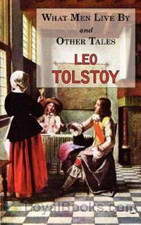 What Men Live By and Other Tales
What Men Live By and Other Tales
Although Leo Tolstoy (1828-1910) was a wealthy landowner, in his later life he had what was considered a “religious awakening.” This experience went on to inform his writing and his lifestyle in profound ways. His views transcended the specifics of religion, as known in his day – so much so he came to be a helpful guide both to Mohandas Gandhi and to Dr. Martin Luther King Jr. The four stories in this collection ask profound questions and gently supply helpful, non-dogmatic hints to their... | |
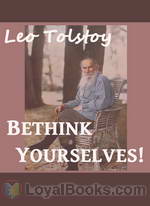 Bethink Yourselves!
Bethink Yourselves!
As Russia goes to war against Japan, Tolstoy urges those at all levels of society, from the Tsar down to the common soldier, to consider their actions in the light of Christ's teaching. "However strange this may appear, the most effective and certain deliverance of men from all the calamities which they inflict upon themselves and from the most dreadful of all—war—is attainable, not by any external general measures, but merely by that simple appeal to the consciousness of each separate man which, nineteen hundred years ago, was proposed by Jesus—that every man bethink himself, and ask himself, who is he, why he lives, and what he should and should not do... | |
By: Mark Twain (1835-1910) | |
|---|---|
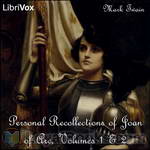 Personal Recollections of Joan of Arc, Volumes 1 & 2
Personal Recollections of Joan of Arc, Volumes 1 & 2
Mark Twain’s work on Joan of Arc is titled in full “Personal Recollections of Joan of Arc, by the Sieur Louis de Conte.” De Conte is identified as Joan’s page and secretary. For those who’ve always wanted to “get behind” the Joan of Arc story and to better understand just what happened, Twain’s narrative makes the story personal and very accessible. The work is fictionally presented as a translation from the manuscript by Jean Francois Alden, or, in the words of the published book, “Freely Translated out of the Ancient French into Modern English from the Original Unpublished Manuscript in the National Archives of France... | |
By: Unknown | |
|---|---|
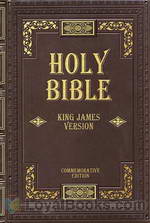 The Bible, King James Version (KJV) - Introduction
The Bible, King James Version (KJV) - Introduction
Variously known as the Greatest Story Ever Told, The Book of Books and many other names, the Bible is reputed to be the biggest bestseller of all time. Translated into thousands of world languages and studied, worshiped and revered in the four corners of the earth, the Bible remains Christianity's canonical text and is considered the Word of God. The King James Version (KJV) is a translation commissioned by the Church of England in 1604 and the work continued till 1611. However, it wasn't the first translation into English from the original Hebrew, and some portions in Aramaic... | |
By: Frances Hodgson Burnett (1849-1924) | |
|---|---|
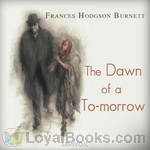 The Dawn of a To-morrow
The Dawn of a To-morrow
A wealthy London business man takes a room in a poor part of the city. He is depressed and has decided to take his life by going the next day to purchase a hand gun he had seen in a pawnshop window. The morning comes with one of those 'memorable fogs' and the adventure he has in it alters his decisions and ultimately his life. | |
By: Robert Young (1822-1888) | |
|---|---|
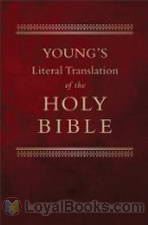 The Bible, Young's Literal Translation (YLT) - Genesis
The Bible, Young's Literal Translation (YLT) - Genesis
Young's Literal Translation is a translation of the Bible into English, published in 1862. The translation was made by Robert Young, compiler of Young's Analytical Concordance to the Bible and Concise Critical Comments on the New Testament. Young produced a "Revised Version" of the translation in 1887. After he died on October 14, 1888, the publisher in 1898 released a new Revised Edition.Young's Literal Translation in the 1898 Edition also consistently renders the Hebrew Tetragrammaton (divine name)... | |
By: Alexandre Dumas (1802-1870) | |
|---|---|
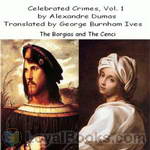 Celebrated Crimes
Celebrated Crimes
Dumas's 'Celebrated Crimes' was not written for children. The novelist has spared no language -- has minced no words -- to describe the violent scenes of a violent time.In some instances facts appear distorted out of their true perspective, and in others the author makes unwarranted charges. The careful, mature reader, for whom the books are intended, will recognize, and allow for, this fact.The first volume comprises the annals of the Borgias and the Cenci. The name of the noted and notorious Florentine family has become a synonym for intrigue and violence, and yet the Borgias have not been without stanch defenders in history... | |
By: G. K. Chesterton (1874-1936) | |
|---|---|
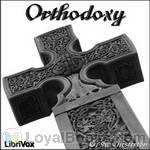 Orthodoxy
Orthodoxy
Orthodoxy is a book that has become a classic of Christian apologetics. In the book's preface Chesterton states the purpose is to "attempt an explanation, not of whether the Christian faith can be believed, but of how he personally has come to believe it." In it, Chesterton presents an original view of the Christian religion. He sees it as the answer to natural human needs, the "answer to a riddle" in his own words, and not simply as an arbitrary truth received from somewhere outside the boundaries of human experience. | |
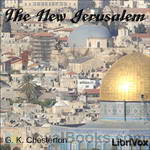 The New Jerusalem
The New Jerusalem
“On the road to Cairo one may see twenty groups exactly like that of the Holy Family in the pictures of the Flight into Egypt; with only one difference. The man is riding on the ass.” “The real mistake of the Muslims is something much more modern in its application than any particular passing persecution of Christians as such. It lay in the very fact that they did think they had a simpler and saner sort of Christianity, as do many modern Christians. They thought it could be made universal merely by being made uninteresting... | |
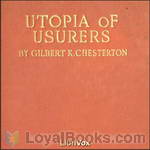 A Utopia of Usurers
A Utopia of Usurers
“Now I have said again and again (and I shall continue to say again and again on all the most inappropriate occasions) that we must hit Capitalism, and hit it hard, for the plain and definite reason that it is growing stronger. Most of the excuses which serve the capitalists as masks are, of course, the excuses of hypocrites. They lie when they claim philanthropy; they no more feel any particular love of men than Albu felt an affection for Chinamen. They lie when they say they have reached their position through their own organising ability... | |
By: H. Rider Haggard | |
|---|---|
 The Wizard
The Wizard
Described by the author, best known for his King Solomon's Mines, as "a tale of victorious faith," this story begins on a Sunday afternoon in an English church. Most of the book, though, is set in Africa, and the adventure story is as engaging as any of Haggard's African tales. What makes this one different is the religious question: What has happened to miracles in the church? Is there any power left in Jesus' promise, "Whoso that believeth in me, the works that I do he shall do also, and whatsoever ye shall ask in my name, that will I do"? | |
By: George MacDonald (1824-1905) | |
|---|---|
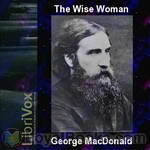 The Wise Woman
The Wise Woman
George MacDonald was an influential Scottish author, poet, and Christian minister. MacDonald’s works (particularly his fairy tales and fantasy novels) claimed the admiration of such authors as J. R. R. Tolkien, C. S. Lewis, and Madeleine L’Engle. The Wise Woman fairy tale was one of MacDonald’s more popular works. This delightful story describes how a woman of mysterious powers pays visits to two very different young girls: one a princess, the other a shepherd’s daughter. Neither girl is left unchanged by the startling events that are unleashed as a result: and the reader is confronted by astonishing fairy-worlds in which the girls are forced to choose between good and evil... | |
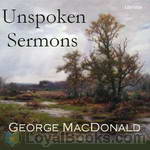 Unspoken Sermons
Unspoken Sermons
George MacDonald was a Scottish author, poet, and Christian minister. In his day he was considered one of the great Victorian authors on par with Dickens, Thackeray, Kipling and the like. His reputation as an author, however, has not fared as well largely because of the ubiquitous and fervent presence of religion throughout his works.MacDonald's theology, though sprinkled liberally throughout his fairly substantial number of books, is perhaps nowhere more palpable than in Unspoken Sermons. These sermons, though by no means amongst the most popular of MacDonald's work, have had theological impact from their first appearance... | |
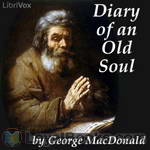 Diary of an Old Soul
Diary of an Old Soul
George MacDonald, a Scottish pastor, wrote these short poems, one for each day of the year, to help him with the severer misfortune he was experiencing. The poems are filled with hope and promises of Christ, yet, he also writes about his doubts. These poems are wonderful to listen to for people of any religion. | |
 Miracles of Our Lord
Miracles of Our Lord
Actions, it is often said, speak louder than words. But in the life of Christ - as George MacDonald shows - both spoke with an equal volume. Much attention is often devoted to what Jesus said while He was on earth, but many in our modern age are puzzled by the miracles. What are we to make of them? MacDonald - wise and gentle as ever - invites us into the miracles as a doorway into the inner life of Christ that we may intimately know Him and His Father. | |
By: Friedrich Nietzsche | |
|---|---|
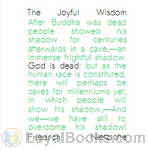 The Joyful Wisdom
The Joyful Wisdom
The Joyful Wisdom (later translated as The Gay Science), written in 1882, just before Zarathustra, is rightly judged to be one of Nietzsche’s best books. Here the essentially grave and masculine face of the poet-philosopher is seen to light up and suddenly break into a delightful smile. The warmth and kindness that beam from his features will astonish those hasty psychologists who have never divined that behind the destroyer is the creator, and behind the blasphemer the lover of life. In the retrospective... | |
By: James Allen (1864-1912) | |
|---|---|
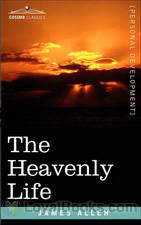 The Heavenly Life
The Heavenly Life
Many of us live with the belief that we can achieve heaven or the ultimate peace and happiness only in an after-life. Many of us believe that heaven is a place that is far removed from earth. However, The Heavenly Life by James Allen seeks to convince us that heaven and hell are both here on earth and they lie within our own selves. A deeply moving, insightful and philosophical book that explores the ideas of living with integrity, in harmony with our fellows and in finding the power of love and integrity, The Heavenly Life was first published in 1903... | |
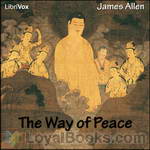 The Way of Peace
The Way of Peace
The Way of Peace is your guide to the power of meditation; self and truth; the acquirement of spiritual power; the realization of selfless love; entering into the infinite; saints, sages, and saviors; the law of service; and the realization of perfect peace. | |
By: John Bunyan | |
|---|---|
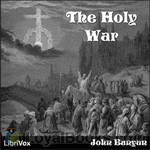 The Holy War
The Holy War
The Holy War is perhaps John Bunyan’s second most popular work, after The Pilgrim’s Progress. It tells the story of afierce battle to take control of a city from its rightful ruler. | |
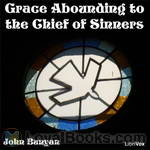 Grace Abounding to the Chief of Sinners
Grace Abounding to the Chief of Sinners
Grace Abounding is the spiritual autobiography of John Bunyan, who also penned Pilgrim’s Progress, perhaps one of the most significant pieces of Christian literature, second only to the Bible. Grace Abounding follows Bunyan’s struggle to find true repentance and forgiveness, his battle with Satan’s temptations of unbelief, his comfort found in the Bible and his overarching victory gotten by the grace of God through Jesus Christ his Son. Readers familiar with Pilgrim’s Progress will recognize... | |
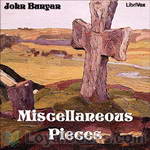 Miscellaneous Pieces
Miscellaneous Pieces
John Bunyan (November 28, 1628 – August 31, 1688), a Christian writer and preacher, was born at Harrowden (one mile south-east of Bedford), in the Parish of Elstow, England. He wrote The Pilgrim’s Progress, arguably the most famous published Christian allegory. In the Church of England he is remembered with a Lesser Festival on 30 August. Bunyan became a popular preacher as well as a prolific author, though most of his works consist of expanded sermons. In theology he was a Puritan, but there was nothing gloomy about him. The portrait his friend Robert White drew, which has often been reproduced, shows the attractiveness of his true character. | |
By: John Bunyan (1628-1688) | |
|---|---|
 Pilgrim's Progress in Words of One Syllable
Pilgrim's Progress in Words of One Syllable
The Pilgrim's Progress from This World to That Which Is to Come is a Christian allegory written by John Bunyan and published in February, 1678. It is regarded as one of the most significant works of religious English literature, has been translated into more than 200 languages, and has never been out of print. The author says in the preface " I have endeavored as far as possible to avoid hard and technical expressions, and I cannot but think that the mere fact of the brevity of the words must be a great attraction to beginners of all ages. | |
By: John Milton (1608-1674) | |
|---|---|
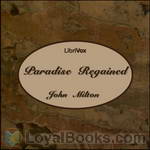 Paradise Regained
Paradise Regained
Paradise Regained is a poem by the 17th century English poet John Milton, published in 1671. It is connected by name to his earlier and more famous epic poem Paradise Lost, with which it shares similar theological themes. Based on the Gospel of Luke’s version of the Temptation of Christ, Paradise Regained is more thoughtful in writing style, and thrives upon the imagery of Jesus’ perfection in contrast to the shame of Satan. | |
By: Andrew Lang (1844-1912) | |
|---|---|
 Tales of Troy: Ulysses the Sacker of Cities
Tales of Troy: Ulysses the Sacker of Cities
These are short stories about the life of Ulysses, the stealing of Helen, Paris, battles, Trojan horses, and more! | |
 Custom and Myth
Custom and Myth
CUSTOM AND MYTHINTRODUCTION.Though some of the essays in this volume have appeared in various serials, the majority of them were written expressly for their present purpose, and they are now arranged in a designed order. During some years of study of Greek, Indian, and savage mythologies, I have become more and more impressed with a sense of the inadequacy of the prevalent method of comparative mythology. That method is based on the belief that myths are the result of a disease of language, as the pearl is the result of a disease of the oyster... | |
By: Saint Ambrose (337/340-397) | |
|---|---|
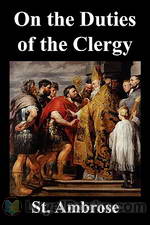 On the Duties of the Clergy
On the Duties of the Clergy
Aurelius Ambrosius was a fourth century cleric who rose to become the Archbishop of Milan in 374 AD. His father was a powerful Roman general and the prefect of Gaul. His brother and sister were also consecrated as saints by the Catholic Church. As an infant, a swarm of bees settled over his face and flew away without harming the baby, but left behind a drop of honey and this was seen as a sign of his future eloquence and bees are often painted in his portraits as his symbols. Ambrosius (or Ambrose as he is referred to in English) was a highly learned man, well versed in Latin and Greek, theology and many other subjects... | |
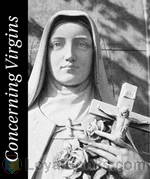 Concerning Virgins
Concerning Virgins
Concerning Virgins (De Virginibus) is a series of letters, compiled into three “books,” St. Ambrose wrote to his sister, Manellia, These, perhaps Ambrose’s earliest writings, were written in 377 CE. Written in a rather light-handed non-technical style they appear as ethical guides to women who are contemplating entering nunneries. More importantly, they set the tone for Ambrose’s later writing on ethics. Concerning Virgins was referred to by other patristic writers including St. Jerome, St Augustine and Cassian, and are now included in the extra-biblical cannon of the early church fathers. | |
By: Robert Michael Ballantyne (1825-1894) | |
|---|---|
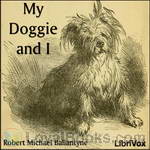 My Doggie and I
My Doggie and I
This story surrounds a child waif, a young woman, a young gentleman doctor, and an elderly lady. This tale unfolds the story of a bond that brings these unlikely friends together and merges their separate paths of life into one common path. The bond is "Dumps", or "Pompey", the "doggie". With many twists, turns, and uncertainties, the ending may surprise the reader. All's well that ends well in this doggie "tail". (Introduction by Allyson Hester) | |
By: John Donne (1572-1631) | |
|---|---|
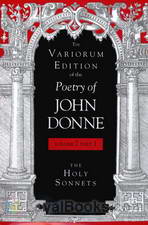 Holy Sonnets
Holy Sonnets
John Donne (1572 – March 31, 1631) was a Jacobean poet and preacher, representative of the metaphysical poets of the period. His works, notable for their realistic and sensual style, include sonnets, love poetry, religious poems, Latin translations, epigrams, elegies, songs, satires and sermons. His poetry is noted for its vibrancy of language and immediacy of metaphor, compared with that of his contemporaries. Towards the end of his life Donne wrote works that challenged death, and the fear that it inspired in many men, on the grounds of his belief that those who die are sent to Heaven to live eternally... | |
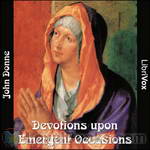 Devotions upon Emergent Occasions
Devotions upon Emergent Occasions
Devotions upon Emergent Occasions is a 1624 prose work by the English writer John Donne. It is a series of reflections that were written as Donne recovered from a serious illness, believed to be either typhus or relapsing fever. (Donne does not clearly identify the disease in his text.) The work consists of twenty-three parts describing each stage of the sickness. Each part is further divided into a Meditation, an Expostulation, and a Prayer. The seventeenth meditation is perhaps the best-known part of the work... | |
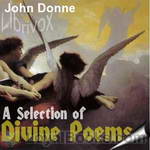 A Selection of Divine Poems
A Selection of Divine Poems
John Donne was an English Jacobean preacher, sometime lawyer, later in life a Member of Parliament and Royal Chaplain. Marrying for love against the wishes of his influential father-in-law; Donne's career was cast into shadow: forcing him to support his wife, Anne, as best he might under a specter of unforgiving penury. Despite such hardships - perhaps because of them - Donne's writings demonstrate a mastery of poetry layered with metaphysical meaning and mystery: which continues to delight and challenge modern-day readers... | |
By: Saint Augustine of Hippo (354-430) | |
|---|---|
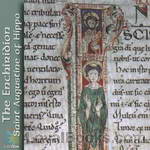 The Enchiridion
The Enchiridion
The Enchiridion, Manual, or Handbook of Augustine of Hippo is alternatively titled, “Faith, Hope, and Love”. The Enchiridion is a compact treatise on Christian piety, written in response to a request by an otherwise unknown person, named Laurentis, shortly after the death of Saint Jerome in 420. It is intended as a model for Christian instruction or catechesis. – As the title indicates, the work is organized according to the three graces necessary for the Christian worship of God: Faith, Hope and Love... | |